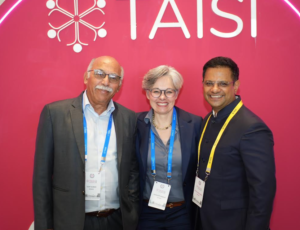Shaping the Classroom of Tomorrow: Global Experts Discuss Education 4.0 at TAISI Event
Bengaluru, 9th November 2024 – At the 20th Annual Conference of The Association of International Schools of India (TAISI), held between 7th to 9th November 2024, two major announcements were made, setting the stage for a significant transformation in the Indian education sector. Under the theme “Shaping Hyper-Connected, Future-Forward Schools,” the conference introduced Education 4.0, an approach designed to integrate practical, contemporary applications such as Artificial Intelligence (AI), social media, and emotional intelligence into the educational curriculum. This innovative model aimed at empowering school leaders and educators to align with the evolving demands of a technology-driven world. The conference also marked the debut of the Australian Curriculum in India, offering a new, diverse educational framework that emphasized adaptability, critical thinking, and holistic development.
TAISI’s initiatives were seen as game-changers in redefining educational standards and expanding choices, giving schools the tools to meet the challenges of modern education head-on. The conference attracted over 300 international schools from India, alongside participants from more than 10 countries. Over 40 speakers participated in 16 interactive sessions, exploring a wide range of topics. One highlight was the keynote delivered by an advanced AI humanoid, Ria, who discussed the transformative impact of AI on learning. Additionally, Mr. Sultan announced the upcoming calendar, which featured exciting initiatives such as the introduction of the TAISI International School Sports League (ISSL) and the TAISI Esports Prix.
Syed Sultan Ahmed, Chairperson of TAISI, emphasized the importance of these initiatives, stating, “Integrating practical applications of AI and global curricula into our educational frameworks is essential in today’s world. These advancements go beyond exam preparation; they equip students with the skills needed to succeed in an increasingly interconnected environment. Importantly, students shouldn’t have to wait until college to gain these competencies. By introducing them at the school level, we ensure they are well-prepared to navigate the evolving demands of both education and the modern workforce.”
Vijay Kumar, Chief Guest at the TAISI Conference, Founding Executive Director of J-WEL & Senior Advisor to the VP of Open Learning at the Massachusetts Institute of Technology (MIT), said, “The future of education requires our ability to judiciously integrate technology and human-centric learning informed by the science of learning (in our practice). We have to change the way we think about preparing students for the changing global economy. As educators, we need to embrace AI and other digital learning tools, as well as social-emotional learning, not just as content to be taught but as an intrinsic part, in fact as partners, in providing holistic learning experiences. What we aim for is to help shape a generation of change makers who not only respond to change but proactively drive it.”
Kathleen Naglee, Education Futurist & Head of School at the International School of Helsinki, shared her thoughts on how AI is changing education, saying, “As we begin to embrace this new era of education, the use of AI—such as my digital twin ‘Katbot’—allows us to explore how learners emotionally engage with specific educational activities. As we discover incredible opportunities in this space, it is crucial to approach them with responsibility, being mindful of the ethical and emotional implications in shaping the future of education. The next generation of learners must not only be equipped with technical knowledge but also with resilience and empathy to navigate an ever-changing world.”

Education 4.0: The Next Step in Practical, Technology-Driven Education
A key shift highlighted at the conference was the move towards Education 4.0, which integrated AI, social media, and Emotional Intelligence into educator professional development. This shift provided teachers with essential tools to navigate the rapidly evolving educational landscape. International workshops were organized, featuring interactive sessions that covered topics such as gamification, mental health support, and fostering inclusive classrooms. These sessions aimed to offer educators actionable insights for student-centered teaching.
Unlike traditional teaching methods, which often confined such topics to textbooks or lectures, the new approach emphasized hands-on experiences. The experiential learning framework, once implemented, enabled students to develop critical skills and digital fluency, which are vital for real-world problem-solving and adaptability. By training educators to incorporate these practical applications into their daily teaching, schools would better prepare students for the demands of higher education and the workforce, while fostering critical thinking and proactive learning habits.
The 20th Annual TAISI Conference underscored the importance of evolving educational practices to meet the challenges of the modern world. Through practical, experience-based learning and exposure to global standards, these initiatives supported a shift toward a more adaptive and comprehensive educational model, aimed at enhancing students’ personal and academic growth.
